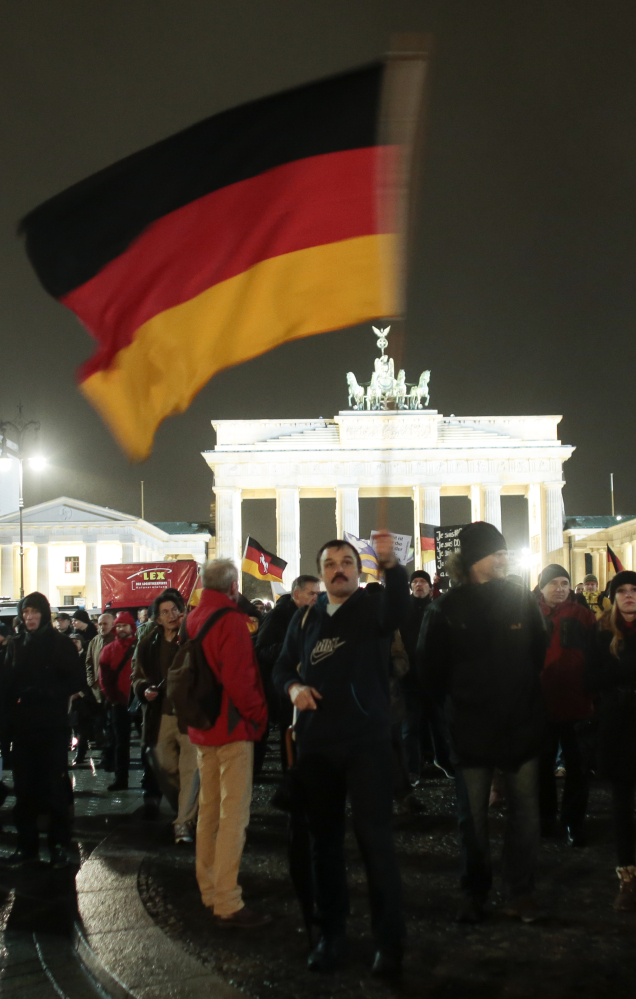GROSSROEHRSDORF, Germany — The 17 North African refugees turned up just before Christmas – and Simon Richter felt nothing to cheer.
The electrician and his friends organized a meeting that sent out a message loud and clear: We don’t want the foreigners in our midst. Within days, authorities caved to pressure and moved the young men elsewhere.
The episode reflects the increasingly tense mood in the eastern state of Saxony, where anti-immigrant protests have been growing by the week, drawing international attention and fears that xenophobia is on the rise again in Germany – whose Nazi past has long made such sentiments taboo.
OVER 25,000 MARCH IN DRESDEN
Police said more than 25,000 marched through the state capital, Dresden, on Monday under the banner of a group calling itself Patriotic Europeans against the Islamization of the West, or PEGIDA. Organizers claimed 40,000 had attended, despite calls from Germany’s justice minister to cancel the rally because of last week’s terror attacks in Paris.
Some marchers wore black ribbons to show their solidarity with the victims and held up placards with the names of the French journalists killed. Others carried banners condemning the “lying press” that they claim misrepresents their cause.
Co-organizer Lutz Bachmann said “the terrible acts of Paris are further proof that PEGIDA is needed.”
Hours before the rally, German Chancellor Angela Merkel spoke out strongly against the protesters, citing a comment by former president Christian Wulff that Islam is a part of Germany.
“That’s how it is – I think that too,” she told reporters on the sidelines of a meeting with Turkey’s Prime Minister Ahmet Davutoglu.
Merkel, the leader of Germany’s conservative Christian Democrats, said she was confident that Muslims themselves reject violence such as that seen in Paris.
Many of the Dresden marchers in the last few months come from rural areas near the borders with Poland and the Czech Republic. During the rallies they hold up signs with the names of their towns and villages, and insist they aren’t racist – just ordinary people worried about crime – though skinheads and far-right activists are visible among the crowd.
“I think they’ve got a legitimate cause,” said Richter, who has attended several PEGIDA protests himself.
Shortly after the asylum seekers moved into a disused gymnasium that authorities had set aside for them on the outskirts of Grossroehrsdorf, police and firefighters had to be called to deal with a refugee who had injured himself while drunk and another who set fire to some garbage bags.
“You have a lot of people living close to here, as well as a playground and a school,” Richter said. “It was simply the worst place to house refugees in a small community.”
MOOD-CHANGING ACCUSATION
The mood in Grossroehrsdorf – population 6,700 – finally turned against the asylum seekers when a 23-year-old local man reported to police that he’d been assaulted by one of the foreigners.
Days later, police announced that the man had lied. But by then authorities had already decided to shut the gym and disperse the refugees across other asylum centers in the region.
The decision wasn’t just a victory for Richter and his friends. The far-right National Democratic Party, or NPD, also saw a reason to celebrate.
Its local representative, Juergen Koetzing, told The Associated Press that the party supported the protests in Grossroehrsdorf and has helped with logistics behind the scenes during the PEGIDA marches in Dresden.
“We support such events with equipment and the printing of fliers, but the initiative comes from concerned people in the various villages,” Koetzing said. It’s part of the party’s new tactic since narrowly failing to clear the 5 percent threshold in Saxony’s regional elections last year.
“Until the next election we’re going to be doing what I’ll call grassroots policy,” said Koetzing, a construction engineer.
As far as PEGIDA is concerned, “we’re not going to push to the front,” he said. “On the basic thrust here, about foreigners taking over Germany, we’re in agreement with PEGIDA.” PEGIDA representatives declined to speak to The Associated Press on Monday.
Protestant pastor Stefan Schwarzenberg, who supports the refugees, said people in Saxony remain affected by decades of communist rule, even 25 years after the end of the dictatorship in East Germany.
“There are people who are still stuck in their old thinking and their old horizon,” he said.
Schwarzenberg said the fear of Muslims was largely based on ignorance.
Copy the Story LinkSend questions/comments to the editors.



Success. Please wait for the page to reload. If the page does not reload within 5 seconds, please refresh the page.
Enter your email and password to access comments.
Hi, to comment on stories you must . This profile is in addition to your subscription and website login.
Already have a commenting profile? .
Invalid username/password.
Please check your email to confirm and complete your registration.
Only subscribers are eligible to post comments. Please subscribe or login first for digital access. Here’s why.
Use the form below to reset your password. When you've submitted your account email, we will send an email with a reset code.